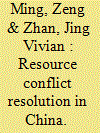|
|
|
Sort Order |
|
|
|
Items / Page
|
|
|
|
|
|
|
| Srl | Item |
| 1 |
ID:
125554


|
|
|
|
|
| Publication |
2013.
|
| Summary/Abstract |
Since the electricity market reforms of 2002, two large-scale power shortages, one occurring in 2004 and one in 2011, exerted a tremendous impact on the economic development of China and also gave rise to a fierce discussion regarding electricity system reforms. In this paper, the background and the influence scale of the two power shortages are described. Second, reasons for these two large-scale power shortages are analyzed from the perspectives of power generation, power consumption and coordination of power sources and grid network construction investments. Characteristics of these two large-scale power shortages are then summarized by comparatively analyzing the performance and the formation of the reasons behind these two large-scale power shortages. Finally, some effective measures that take into account the current status of electricity market reforms in China are suggested. This paper concludes that to eliminate power shortages in China, both the supply and the demand should be considered, and these considerations should be accompanied by supervisory policies and incentive mechanisms.
|
|
|
|
|
|
|
|
|
|
|
|
|
|
|
|
| 2 |
ID:
125495


|
|
|
|
|
| Publication |
2013.
|
| Summary/Abstract |
With the rapid development of the Chinese economy and society, differences in the electric power system load between the peak and valley values are increasing, and inefficient small capacity coal-fired plant units must be involved in load adjustment because gas units and pumped storage units that act as peak-load units are lacking. In addition, due to concerns about energy saving and emissions reduction, clean energy sources are rapidly being developed and deployed. This presents a significant challenge for the construction and planning of peaking power solutions in China. Pumped storage plants provide a means of reducing the peak-to-valley difference and increasing the deployment of wind power, solar photovoltaic energy and other clean energy generation into the grid. Pumped storage plants represent the most mature approach among the peaking power sources and thus are one of China's major investments for the future. This paper presents China's current development of pumped storage plants, their role in the electric power system, the management models for pumped storage plants and the electricity price patterns utilising them. Here, we also analyse China's future plans for pumped storage plants, including the influencing factors and related policies.
|
|
|
|
|
|
|
|
|
|
|
|
|
|
|
|
| 3 |
ID:
153354


|
|
|
|
|
| Summary/Abstract |
Mineral resource extraction has frequently caused social tensions in China. This research examines the reactive and pre-emptive strategies used by the Chinese state to cope with resource conflicts. Based on extensive fieldwork in multiple mining areas, we find that the Chinese local state actively mediates between the mining sector and local citizens, and skilfully suppresses collective protests. More importantly, it pre-emptively intervenes in dispute-prone processes and redistributes resource wealth to create vested interests and mitigate popular grievances. We argue that the active state intervention in resource conflicts in China is driven by the party-state's tight control of local officials, which prevents local capture by resource interests, and enabled by the party-state's deep reach into society, which allows grassroots governments to negotiate between conflicting interests and mobilize resources towards conflict resolution.
|
|
|
|
|
|
|
|
|
|
|
|
|
|
|
|
|
|
|
|
|